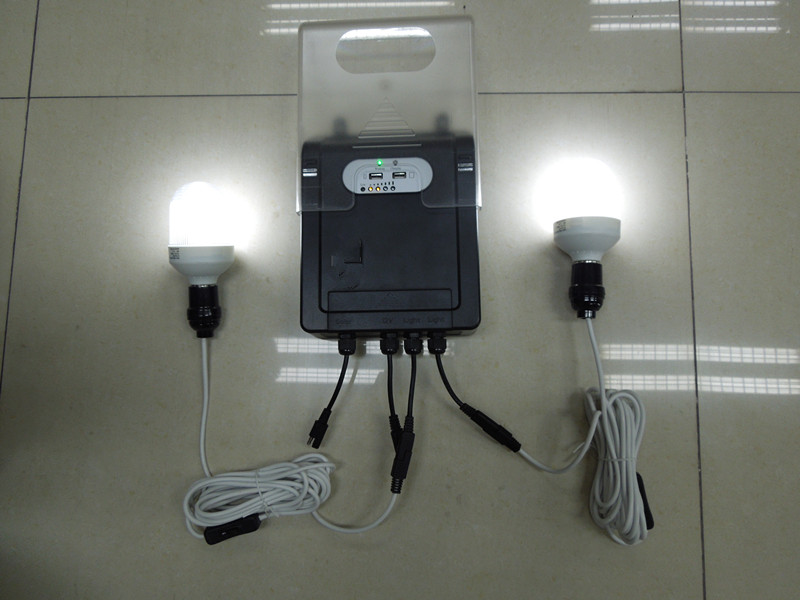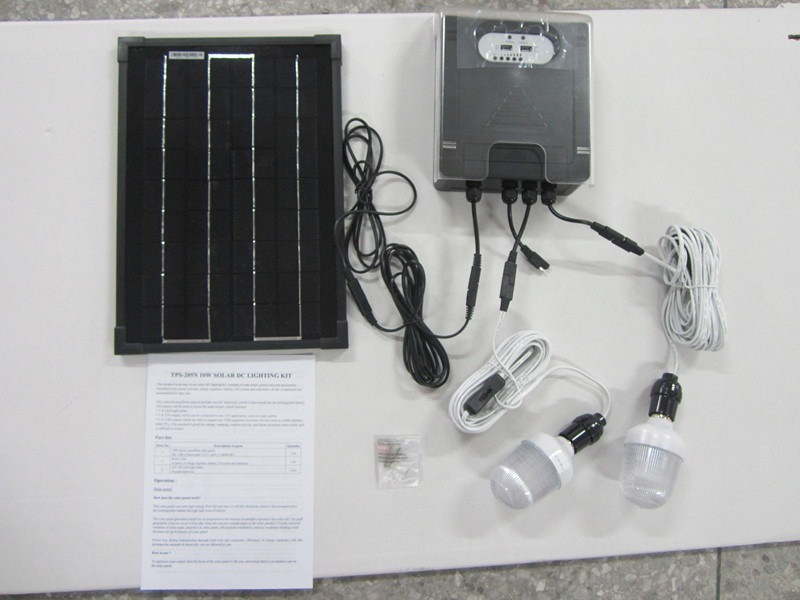TPS-205N 10W Solar wall mount
- Loading Port:
- China Main Port
- Payment Terms:
- TT or LC
- Min Order Qty:
- -
- Supply Capability:
- 50000sets m.t./month
OKorder Service Pledge
Quality Product, Order Online Tracking, Timely Delivery
OKorder Financial Service
Credit Rating, Credit Services, Credit Purchasing
You Might Also Like
TPS-205N 10W Solar Wall Mount Kit
1. 10W Mono Solar panel +12V/7AH Power pack(water resistant cover) + 2pcs 3W LED Lighting with switch +
2pcs USB Charging output (one for iphone and another one for your lamptop)+ 1pcs 12V charging output
2. Working time:more than5 hours for 2pcs LED light, useful for two rooms
3.Mobile phone adapotors and switch wire availbale for power small DC application
Packing Information:
1)1pc*10W Mono solar panel and 1pc*Power pack(metal box)
2)2 pcs 3W LED lights, Switch wire
Outer carton size: 370*165*485mm
Gross weight: 4.9kgs
574 PCS per 20' container


- Q:How much energy can a solar energy system generate?
- The amount of energy a solar energy system can generate depends on various factors such as the size and efficiency of the system, the amount of sunlight available, and the location of the system. On average, a well-designed solar energy system can generate enough electricity to power a significant portion of a household's energy needs. However, larger systems or those installed in areas with abundant sunlight can generate even more energy, potentially allowing for surplus energy to be fed back into the grid.
- Q:Can solar energy systems be used for powering telecommunications towers?
- Yes, solar energy systems can be used for powering telecommunications towers. Solar panels can be installed on the tower or nearby to capture sunlight and convert it into electricity. This renewable energy source provides a sustainable and reliable power solution for remote or off-grid locations, reducing reliance on traditional power sources and lowering operational costs.
- Q:Can solar energy systems be used for powering research laboratories?
- Yes, solar energy systems can definitely be used for powering research laboratories. Solar energy is a clean and renewable source of power that can be harnessed through photovoltaic (PV) panels or solar thermal systems. Research laboratories often require a significant amount of electricity to power various equipment, lighting, and ventilation systems, and solar energy can meet these energy demands effectively. Solar PV panels can be installed on the rooftop or open areas surrounding the laboratory to capture sunlight and convert it into electricity. This electricity can then be used to power the laboratory's infrastructure, including computers, microscopes, refrigeration units, and other specialized equipment. Additionally, excess electricity generated during the day can be stored in batteries or fed back into the grid for later use or to offset energy costs. Solar thermal systems, on the other hand, can be utilized to generate heat for laboratory processes that require heating, such as sterilization or chemical reactions. These systems use sunlight to heat a fluid, which can then be used directly or indirectly to provide heat to the laboratory. Implementing solar energy systems in research laboratories not only reduces the reliance on fossil fuels but also decreases greenhouse gas emissions and contributes to environmental sustainability. Moreover, it can lead to cost savings in the long term as solar energy is essentially free once the initial installation costs are recouped. However, it is important to consider the specific energy requirements of the research laboratory and conduct a comprehensive feasibility study before installing solar energy systems. Factors such as the laboratory's location, available sunlight, roof orientation, and space availability need to be taken into account to ensure optimal system performance. Additionally, the laboratory may need to have a backup power source or grid connection to ensure uninterrupted power supply during periods of low sunlight or high energy demand. Overall, solar energy systems are a viable and sustainable solution for powering research laboratories, providing clean and reliable energy to support scientific advancements.
- Q:Can a solar energy system store excess energy for later use?
- Indeed, excess energy from a solar energy system can be stored for future utilization. This is accomplished by employing batteries or alternative storage technologies. Whenever the solar energy system produces surplus electricity beyond immediate requirements, it can be stored within batteries. Consequently, these batteries can subsequently power the system during instances of limited solar generation, such as nighttime or overcast days. By storing surplus energy, solar energy systems offer a more dependable and uninterrupted power supply, diminishing reliance on the grid and enhancing self-utilization of renewable energy sources.
- Q:How do solar energy systems affect the electrical wiring of a building?
- Solar energy systems can affect the electrical wiring of a building by integrating directly into the existing electrical system. This usually involves the installation of additional equipment such as inverters and meters, as well as the connection of solar panels to the main electrical panel. This integration allows for the generation of solar power to supplement or replace the electricity provided by the utility grid, ultimately reducing reliance on traditional power sources. Overall, solar energy systems require careful planning and installation to ensure compatibility and safety with the building's electrical wiring.
- Q:Are there any environmental impacts associated with solar energy systems?
- Yes, there are some environmental impacts associated with solar energy systems, although they are generally considered to be significantly less harmful than those associated with traditional energy sources. The production and disposal of solar panels can result in the release of greenhouse gases and other pollutants, especially when not properly managed. Additionally, the mining and extraction of raw materials used in solar panels, such as silicon, can have negative environmental consequences. However, these impacts are relatively minor compared to the emissions and pollution caused by fossil fuel-based energy generation. Furthermore, solar energy systems do not produce air or water pollution during operation and do not contribute to climate change. Overall, while there are some environmental impacts associated with solar energy systems, they are far outweighed by the long-term benefits of reducing greenhouse gas emissions and transitioning to clean and renewable energy sources.
- Q:What is the difference between a solar energy system and a solar thermal system?
- A solar energy system refers to a broader term that encompasses both solar thermal systems and photovoltaic systems. Solar thermal systems specifically focus on converting sunlight into heat energy, which is then used for heating water or space. On the other hand, photovoltaic systems convert sunlight directly into electricity using solar panels.
- Q:What is the efficiency of solar energy systems?
- The efficiency of solar energy systems varies depending on various factors such as the type of system, location, and design. On average, solar photovoltaic (PV) panels have an efficiency range of 15% to 20%, while concentrated solar power (CSP) systems can reach efficiencies of up to 40%. However, advancements in technology continue to improve the efficiency of solar energy systems, making them increasingly competitive and viable as a renewable energy source.
- Q:Can solar energy systems be installed on agricultural land?
- Yes, solar energy systems can be installed on agricultural land. In fact, many farmers are increasingly embracing solar energy as a way to generate clean power and reduce their carbon footprint. Solar panels can be installed on unused or marginal land without affecting agricultural activities, providing a dual benefit of sustainable energy production and continued farming.
- Q:Are there any risks of electrical malfunction or failure with solar energy systems?
- Yes, there are some risks of electrical malfunction or failure with solar energy systems. One of the main risks is a faulty or damaged electrical connection, which can result in a loss of power generation or even electrical fires. Additionally, extreme weather conditions such as lightning strikes or strong winds can damage the solar panels or inverters, leading to a temporary or permanent failure of the system. Another risk is the degradation of solar panels over time, which can result in decreased efficiency and eventually require replacements. Furthermore, improper installation or maintenance can lead to system failure or electrical malfunctions. It is essential to ensure that solar energy systems are installed by qualified professionals and regularly inspected and maintained to minimize these risks.
We are a fully vertically integrated solar manufacture and distribution company with a variety of product lines from crystalline solar cells & modules, thin film solar modules, solar stand alone systems to ultra clear PV glass. Started since 1992 as the No. 1 thin film PV module manufacturer in China, Topray engaged both mono crystalline and poly crystalline production from 2005, becoming the most diversified solar manufacturer in China ever since.
1. Manufacturer Overview |
|
|---|---|
| Location | Shenzhen,China |
| Year Established | 2002 |
| Annual Output Value | Above US$80 Million |
| Main Markets | Europe, North America, Africa and Asia. |
| Company Certifications | |
2. Manufacturer Certificates |
|
|---|---|
| a) Certification Name | |
| Range | |
| Reference | |
| Validity Period | |
3. Manufacturer Capability |
|
|---|---|
| a)Trade Capacity | |
| Nearest Port | Shenzhen shekou |
| Export Percentage | 90% |
| No.of Employees in Trade Department | 200-300People |
| Language Spoken: | English;Chinese; |
| b)Factory Information | |
| Factory Size: | Above 300,000 square meters |
| No. of Production Lines | Above 10 |
| Contract Manufacturing | OEM Service Offered;Design Service Offered |
| Product Price Range | Average |
Send your message to us
TPS-205N 10W Solar wall mount
- Loading Port:
- China Main Port
- Payment Terms:
- TT or LC
- Min Order Qty:
- -
- Supply Capability:
- 50000sets m.t./month
OKorder Service Pledge
Quality Product, Order Online Tracking, Timely Delivery
OKorder Financial Service
Credit Rating, Credit Services, Credit Purchasing
Similar products
New products
Hot products
Related keywords


























